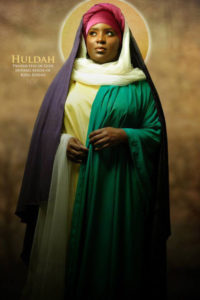Huldah
Her name means: “Weasel”
Her character: Trusted by the king with a matter of great importance, she was a Prophetess whose word ignited a significant religious reform.
Her sorrow: That Yah God’s people refused to respond to him with loving obedience, ignoring repeated warnings about the consequences of their unfaithfulness.
Her joy: As a Prophetess, she was privileged to be a messenger of Yah God.
Key Scriptures: 2 Kings 22:14-20; 2 Chronicles 34:22-33
Her Story
The High Priest, Hilkiah, and several other men of Jerusalem stood before her. King Josiah wanted to know—would the words of the Book of the Law (Torah), which Hilkiah had just discovered in the temple, come to pass? Huldah pressed the leather scroll against her breast, as though cradling a living being. Holding the scroll by its wooden handles, she unrolled it carefully and began reading the Shema: “Hear, O Israel: The Lord our God, the Lord is one (echad). Love the Lord your God with all your heart and with all your soul and with all your strength…. Fear the Lord your God, serve him only, and take your oaths in his name. Do not follow other gods, the gods of the peoples around you; for the Lord your God, who is among you, is a jealous God and his anger will burn against you, and he will destroy you from the face of the land” (Deuteronomy 6:4-5, 13-15).
“Cursed in the city and cursed in the country … sudden ruin because of what you have done … wasting disease … madness, blindness and confusion … an object of scorn and ridicule to all the nations … because you did not obey the Lord your God” (cf. Deuteronomy 28:15-68).
Though her voice was steady, Huldah’s throat felt sore from the effort of speaking such words aloud, terrible threats that made her eyes well over, warnings that spawned vision upon vision from the past. In her mind, she watched as Judah’s Kings Ahaz and Manasseh sacrificed their sons to pagan deities. She saw the smoke of incense rising before pagan idols in the temple. She looked on as prophets were murdered, as diviners and sorcerers were honored JUST LIKE TODAY, as kings bowed down to the stars and the people followed suit, prostituting themselves to false gods and spurning the advances of the Almighty Elohim. She saw the children of Yisrael marching in chains from the land of milk and honey.
Her face flushed as a burning sensation rushed through her body and searing words spilled from her lips: “This is what the God of Yisrael says: ‘I am going to bring disaster on this place and its people, according to everything written in the book the King of Judah has read. Because they have forsaken me and burned incense to other gods and provoked me to anger by all the idols their hands have made, my anger will burn against this place and will not be quenched.’ Tell the king of Judah, who sent you to inquire of the Lord God: ‘Because your heart was responsive and you humbled yourself before the Yah when you heard what I have spoken against this place and its people, that they would become accursed and laid waste, and because you tore your robes and wept in my presence, I have heard you, declares Yah. Therefore I will gather you to your fathers, and you will be buried in peace. Your eyes will not see all the disaster I am going to bring on this place.’ ”
Huldah is one of only four women with an authentic prophetic ministry mentioned in the Old Testament (along with Miriam, Deborah, and Isaiah’s wife). Though prophets like Jeremiah and Zephaniah were also active at the time, King Josiah consulted Huldah about the amazing discovery of the Book of the Law.
Beyond the brief scene imaginatively retold above, we know little of her story—only that Yah God entrusted her with his word in a time of national crisis. A hundred years earlier, Judah had witnessed Yah God’s punishment of the northern kingdom. Faithless Yisrael had been led captive to Assyria, just as the prophets had warned. Huldah surely knew the sordid details. She could not have missed its frightening significance for Judah. She may also have endured part of Manasseh’s fifty-five-year reign, the longest and worst of any king in Judah. Certainly, she would have been heartened by the recent reforms of King Josiah—his attempts to restore the temple though the people had all but forgotten Yah God.
But her words of prophecy confirmed the king’s fear. Judah was standing on a precipice. Yah God was a jealous lover who blessed those who loved and obeyed him and cursed those who did not. Across the centuries, his slow anger was building to a fiery crescendo. Judah’s infidelities had not gone unnoticed. After Huldah’s prophecy, Josiah led one of the greatest Repentance reforms in history, purging Judah and even parts of Yisrael of paganism. But the kings who followed him soon reversed course, leading the people astray once again. Thirty-five years after Huldah’s prophecy, Judah was taken in chains to Babylon and all of its cities were destroyed.
The words of Isaiah, a prophet who preceded Huldah by a few decades, proclaimed a future day of restoration: “They will rebuild the ancient ruins and restore the places long devastated; they will renew the ruined cities…. Instead of their shame my people will receive a double portion, and instead of disgrace they will rejoice in their inheritance” (Isaiah 61:4, 7).
Judgment and mercy, law and grace, punishment and salvation—these are the tensions that characterize the story of Yah God’s love affair with his people Yisrael. Huldah was a woman who understood the paradox and who was not afraid to proclaim the truth, even to a king. Her words must have cost her, but she spoke them anyway. She cherished Yah God’s word in a time of spiritual crisis.
Her Promise
The story of Huldah and her words to the king illustrate the contrast between Yah God’s judgment and his mercy. He judges those who deserve his punishment, but he quickly forgives those who Repent. In fact, he is eager to forgive, waiting only for us to come to him in Repentance. Yah God still loves his people. King coming

0 Comments